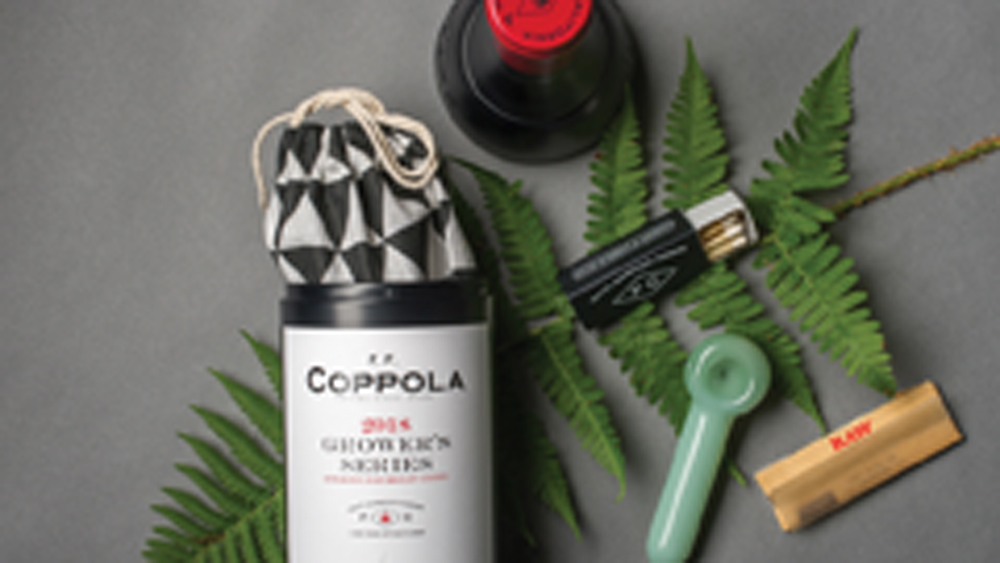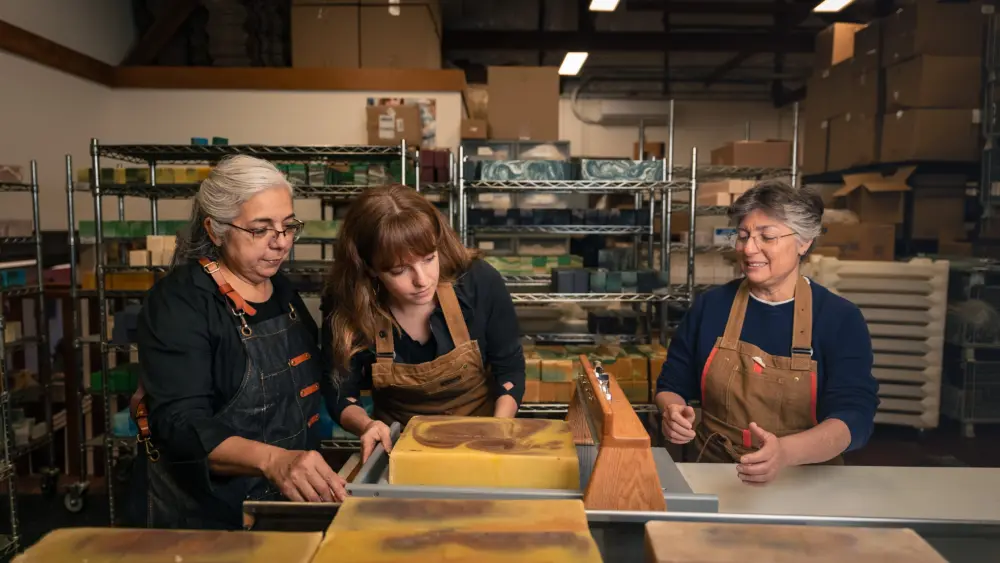
For legendary film director and vintner, Francis Ford Coppola, the business of wine is about taking risks. Throughout the expert production of his varied creative endeavors, he has always understood that consumers change—and he finds a way to stay one step ahead of what the public wants.
Based on a simple mission statement of “Quality, Authenticity and Pleasure,” Coppola has a winemaking legacy that includes renowned estates in California and Oregon. He also branched outside industry tradition by being the first to offer wine in cans, an innovation suited to a casual, on-the-go lifestyle. In the middle of the 2008-09 recession, The Family Coppola made a bold investment by constructing two restaurants and a 3,000-square-foot swimming pool to enhance the gracious ambiance of the Geyserville winery property.
“Francis loves to push the limits,” says Corey Beck, winemaking chief and CEO. “It wasn’t easy at first, but now the industry looks to us for advice with canned wine. We were the first to build a pool in spite of some initial push-back from community members. But some of those same members have called me over the years to get their grandchildren lifeguard jobs.”
Brand and Trust
Beck says customers are loyal to the brand and trust it, so they are willing to “step outside the norms of traditional wine experience.” While their parents’ generation has been enjoying The Family Coppola’s string of worldwide resort “hideaways” and the new line of Coppola Great Women Spirits (Ada Lovelace Gin, Dorothy Arzner Rye, Maria Agnesi Brandy and others), Gen X and Millennials have different alcoholic beverage buying habits. And they have different ways of receiving information.
“Almost everything is done digitally,” notes Beck, who is currently investing significant resources toward online marketing. “The average attention span is less than .08 seconds—yes, I said that correctly. We also know our new consumers want an experience they can be the first to tell their friends about. Understanding this, we’re making sure our brand continues to speak across generations through packaging innovation and engaging with the highest quality products.”
It wasn’t with a particular demographic in mind, however, that Francis Ford Coppola took advantage of California’s legalization of cannabis for recreational use in 2018. He had a vision of developing something on a boutique scale with a product that had been integral to his own creative process.
Kathleen Murphy, vice president of innovation and new business development, is responsible for establishing new ventures and unique partnerships for The Family Coppola. “I’m the pet project person for Francis,” she says. “He starts with a vision, creating things that are near and dear to his heart and authentic to who he is as a human. There isn’t a thing he has created, or a business he has started, that hasn’t been true to what he and his family like to do. Cannabis has been a part of his life, just as enjoying a great wine and a cocktail before dinner.”
Murphy continues, “Francis is about surprising and delighting. With the cannabis venture, he saw the opportunity to bring outdoor, terroir-driven cannabis—similar to the sustainable wine experience—to the consumers who know and love him. And he wanted the packaging to be both fun, playful and an elevated way to educate about the flowers and the selected growers.”
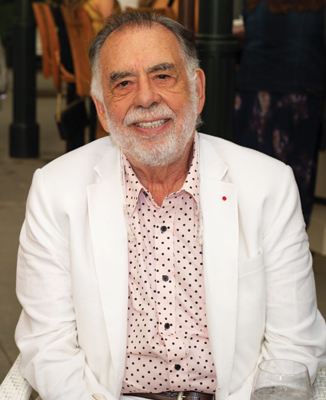
That’s why the product that rolled out in 2018 was called The Grower’s Series. Developed from a papier-mâché prototype and Ziplock baggies that Coppola had initially dropped on Beck’s desk, the first edition “kit” consisted of a pot-leaf embossed tin canister, shaped like a bottle of Coppola wine, that opened at a seam above the signature label. Inside were three, one-gram packages of flower—a sativa-dominant strain, an indica-dominant strain and a hybrid—along with rolling papers, a branded glass pipe and some literature about the distinct sun-grown provenance of the herb.
Forbes quoted Coppola at the time: “Wine and cannabis are two ancient and bounteous gifts of Mother Nature, linked by great care, terroir and temperateness. Expertise making one applies to the other. As with growing grapes, location matters, and The Grower’s Series reflects California agriculture expertise, creating a true blend of art and science.”
However, Murphy notes, many factors were involved from a legal perspective because “cannabis and wine shall not meet under the same company. We had to find a way to fulfill Francis’s dream that was within the law.” The cannabis venture, Sána Company LLC, was established in 2018. (The historical root of the name is from Hindu Sanskrit texts where the word sána is one of several terms used for marijuana.) The company is owned by Francis Ford Coppola and operated independently from The Family Coppola enterprise.
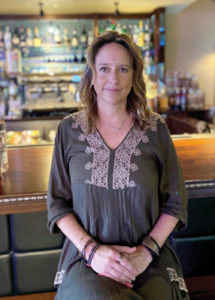
Murphy says it was no easy task finding a licensing partner at the beginning of the project. “You could not just go out and say, “Hey, I need a grower of cannabis.” After extensive networking, and ultimately through a neighbor of Beck’s, the team connected with Johnny Deim and Brett Todoroff of Humboldt Brothers. The co-founders of this sustainable cannabis farm deep in the Emerald Triangle were Coppola’s partners for the 2018 launch of The Grower’s Series. However, as it was for many who entered the legal pot realm early on, constantly shifting and complex regulations did not make life easy. Coppola’s Grower’s Series took a hiatus in 2019.
“We were one of the first family-run wineries to come out with a cannabis brand,” Murphy explains. “The law was still being interpreted, there were so many learnings in the first year and a half. We discovered the quick pivot, but we eventually decided to take a breather. Our intention was to wait for regulations to get firmly established and look for a partner that could do the licensing from beginning to end for us.”
The Grower’s Series does not have a cannabis partner right now. “We are actively looking,” Murphy says. “Because we can’t have involvement, can’t talk directly to our consumers. We have to establish a pure licensing deal. Our partner has to grow outdoors sustainably to a high standard and also must have very, very strong delivery capabilities, directly to consumers’ doors all around California. We need seamless integration from cultivation to product development to sales to distribution.”
While they are searching for the right partner, Murphy and her team are designing the 2021 products and packaging. Like the original “weed kit,” their luxury gift item consists of a wine bottle tin labeled with the Grower’s Series “vintage” year, celebrating the best of harvest. (This package sold for $99 in 2018). In addition, they will introduce “everyday products” such as pre-rolls and packaged flowers.
Murphy compares the cannabis products, appropriately, to the wine offerings. “We have our flagship brand, Archimedes, at $120 a bottle that comes from the Archimedes Estate vineyard; and we have Coppola Diamond, which is more of the everyday wine. Just as we believe that the best grapes are grown in Napa and Sonoma, we also want to acknowledge our regional growers who labor to deliver this other extraordinary agricultural product.”
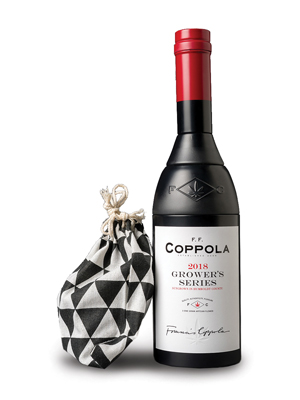 Crossover Consumers?
Crossover Consumers?
The target consumers for The Grower’s Series are those who are already fans of Coppola and are drinking the wine brands. They are those cannabis-curious individuals who are willing to spend at a luxury price point and are open to marketing and outreach based on the name recognition of Francis Ford Coppola.
Murphy believes her potential buyers are not going into dispensaries, either because of inconvenience, stigma, or “just because the sector is much more complicated than when they purchased a nickel bag back in their college days.” These are the very consumers who are now older and educated, who like the finer things in life, care about what’s on their plate and or in their glass and want to try cannabis as a potential addition to their lifestyle.
When cannabis was first legalized, there was a big question of whether it would impact the consumption of alcohol. “I don’t think cannabis has affected the wine trade as much as people feared,” says Beck. “The one area we did feel some disruption has been in the labor pool, as cannabis farms had better profit margins and could pay more for skilled labor. It’s not surprising that wine sales have been flat since COVID because of the shutdown of on-premise restaurants. We’re fortunate that we have a trusted brand with unique packaging that really helps in off-premise sales.”
Murphy believes cannabis consumption has been a more detrimental to the beer world than the wine world. “There has not been significant substitution [of cannabis for wine]. They each address different need states, even though they both deliver relaxation and unwinding at the end of the day.”
According to a report from BDS Analytics, about 40 percent of all alcohol consumers also consume cannabis. Of that 40 percent, half say there are occasions when they consume alcohol and other times when they consume cannabis, but they don’t overlap. The substances answer different need states. (The other half of the sample says they answer the same need states.) But of the dual consumers, only 14 percent actually say they are drinking less alcohol. They are adding on instead of substituting.
“I find it remarkable that there are some need states that cannabis answers that alcohol doesn’t,” Murphy says. “You might choose wine to go with dinner, or to relax and unwind. For intense focusing, or moments of clarity, especially with creative endeavors, you might choose cannabis. Or for fitness. If you had told me in college when we were smoking joints that sometime in the future people would be consuming cannabis to go to the gym, I would have thought you were crazy.”
Tinkering with beverages
Would Coppola consider cannabis-infused wine? The short answer is “no,” says Murphy. “First, Francis is traditional, and he is authentic. Cannabis-infused wine is not who he is. His relationship and history with cannabis is smoking flower, passing it around, being social. The edibles don’t make sense to him.”
The second reason is the current quality of the product. Murphy admits that the technology has improved in recent years, but in her opinion, cannabis-infused “wine” doesn’t really taste like you are drinking wine, even if the beverage itself is tasty. “We believe the consumer disappointment is too great for us to want to go in that direction.”
Future Proofing
Beck, whose wine roots go back to working in Napa Valley vineyards with his grandfather, has been at Coppola for 23 years. Murphy, who speaks four languages, has served on global teams and managed international brand development for the likes of Campari and E&J Gallo. Before her current position, she led innovation of new products at Constellation Brands. What both individuals like about working with the Coppola organization is the way Francis intuits the wants, needs and motivations of consumers and is willing to take risks to be a step ahead.
“We have a wine business, a spirits business and now we are entering the cannabis business because that is what is hot and happening,” Murphy says. “While the wine business has been flat the last couple of years, we’ve seen a lot of growth in spirits. You need to watch where the consumers are migrating and you need ask, are we going to innovate with the changes or are we going to let our competitors innovate?”
This is what the Coppola team refers to as “future-proofing.” While some purveyors have responded to the desires of health-conscious consumers by moving to alcohol-free seltzers or cannabis-infused beverages, they have evolved their portfolio with yet another brand: Pool House, a low-calorie, low alcohol wine.
Set to launch in 2021, the Pool House brand, available in four varietals, will be sold at the winery and available at one major retailer in eleven states. The wine will come in either a 750 ml bottle (priced at about $15) or in cans; it will be a test to discover consumers’ favored format in this the new, emerging category.
“There are very few low-alcohol brands out there now, and we’re carving our own niche as a great tasting grab-and-go wine that happens to be low in calories. We learned that while the category started as being more female-focused—you want to look good in your yoga pants—men were drinking just as much as women,” Murphy says. “It’s an all-embracing beverage for all kinds of activities—a real lifestyle brand.”
Keeping ahead of consumers might not be exactly the intent of The Family Coppola and its innovation team. Even within the name of the overall organization is the word “family” which implies a community of love and respect that you gradually come to know and try to please. You are not so much ahead of your customers as you are paying close attention to their movements and trying to travel alongside.
Part of the Francis Ford Coppola community are the 150-plus grape-growers with whom Beck engages on an ongoing basis, and the industry leaders with whom he serves on industry councils and symposia. This unique community is also comprised of cannabis growers, distillers, designers, marketers and researchers, each one helping to bring the ideas of Coppola himself to fruition.
“I’ve worked in the wine industry for a long time, and I saw what Francis did was seemingly so effortless,” Murphy concludes. “The disruption he brought to the wine category was always done in such a gentle, yet effective way. I always found him and the organization to be an inspiring place that believed in the gut, and felt what people wanted, as opposed to doing a lot of research. Not a lot of companies are risk-takers the way Francis is.”


